Application for Legal Counsel Position
Subject: Application for Legal Counsel Position
Dear Hiring Manager,
I am writing to express my interest in the Legal Counsel position at [Company Name]. With over five years of experience in corporate law and a proven track record in contract negotiation and compliance, I am confident in my ability to provide sound legal guidance to your organization.
My background includes advising clients on complex regulatory matters, drafting and reviewing contracts, and representing organizations in legal proceedings. I pride myself on my meticulous attention to detail and my ability to translate complex legal concepts into practical business solutions.
I am enthusiastic about the prospect of contributing to [Company Name]'s success and would welcome the opportunity to discuss how my skills align with your needs.
Thank you for your consideration.
Sincerely,
[Your Name]
Internship Request Email for Law Students
Subject: Internship Opportunity Inquiry
Dear [Recipient Name],
I hope this message finds you well. My name is [Your Name], and I am currently a third-year law student at [University Name]. I am reaching out to inquire about potential internship opportunities within your firm this summer.
I am particularly interested in [specific practice area], and I believe an internship at your organization would provide invaluable hands-on experience. I am eager to contribute my dedication and enthusiasm to support your team.
Thank you very much for your time and consideration. I would be happy to provide my CV or any additional information at your convenience.
Best regards,
[Your Name]
Follow-up Email After Legal Job Interview
Subject: Thank You – [Position Name] Interview
Dear [Interviewer Name],
I wanted to take a moment to thank you for the opportunity to interview for the [Position Name] at [Company Name]. I appreciated learning more about the team and the firm's commitment to excellence in legal services.
Our discussion reinforced my enthusiasm for the role and my belief that my skills in [specific area] would contribute meaningfully to your ongoing projects. Please feel free to reach out if you require any further information.
Thank you again for your time and consideration.
Sincerely,
[Your Name]
Provisional Legal Reference Letter
Subject: Reference for [Candidate Name]
To Whom It May Concern,
I am pleased to provide this reference for [Candidate Name], who has worked under my supervision at [Organization Name] for the past [X] years. During this time, [he/she/they] demonstrated exceptional legal acumen, professionalism, and dedication to client service.
[Candidate Name]'s expertise spans contract law, litigation support, and compliance matters. I am confident that [he/she/they] will bring the same level of excellence to any future role.
Please do not hesitate to contact me for further information.
Sincerely,
[Referee Name]
Legal Complaint Email to Client
Subject: Urgent Matter Regarding Your Case
Dear [Client Name],
I am writing to inform you of a development concerning your ongoing legal matter. It is imperative that we discuss the recent updates to ensure we take the necessary actions promptly.
Please let me know your availability for a meeting or call at the earliest convenience. Your timely response will help us protect your interests effectively.
Thank you for your attention to this matter.
Best regards,
[Your Name]
What / Why: Purpose of Legal Cover Letters
What is a Legal Cover Letter and Why It Matters
- A legal cover letter is a formal communication sent alongside a CV or application for law and legal positions.
- Its purpose is to introduce the candidate, highlight relevant skills and experience, and demonstrate professional suitability for the role.
- It allows the sender to personalize the application, express interest in the firm or organization, and showcase unique qualifications.
- In cases of internships or provisional positions, it conveys enthusiasm and readiness to learn.
- Overall, it serves as the first impression a potential employer will have, often determining whether the CV is considered.
Who Should Send Legal Cover Letters
Who Should Send Legal Cover Letters
- Law graduates applying for roles in law firms, corporate legal departments, or government agencies.
- Experienced lawyers seeking career advancement or a lateral move.
- Law students seeking internships, clerkships, or research assistant positions.
- Legal professionals applying for temporary or contractual positions.
- Individuals submitting applications for specialized legal fields such as intellectual property, litigation, or compliance.
When to Send a Legal Cover Letter
Scenarios Requiring a Legal Cover Letter
- Applying for full-time legal positions or in-house counsel roles.
- Submitting an internship or clerkship application.
- Following up after a job interview.
- Requesting a legal reference or recommendation.
- Communicating urgent legal matters or updates to clients or colleagues.
- When responding to a job posting that explicitly requests a cover letter.
How to Write and Send a Legal Cover Letter
Steps to Writing and Sending a Legal Cover Letter
- Research the organization and understand the role requirements.
- Select the appropriate tone and style: formal for official positions, casual or enthusiastic for internships.
- Begin with a clear subject line for emails or a strong opening for printed letters.
- Highlight relevant experience, skills, and achievements in legal practice.
- Personalize the content to show alignment with the organization’s goals.
- Conclude with a courteous call-to-action or expression of interest.
- Proofread meticulously for grammar, tone, and legal terminology accuracy.
- Send via email or physical mail depending on the position requirements.
Formatting Guidelines for Legal Cover Letters
Formatting Legal Cover Letters
- Length: Ideally one page, concise and focused.
- Tone: Professional, respectful, and serious. Use formal language for official roles; casual can be used for student inquiries.
- Structure: Include opening, body paragraphs highlighting skills, closing statement, and signature.
- Mode of Sending: Email for digital applications; printed letters for formal submissions or references.
- Wording: Avoid slang; use precise legal terms and clear articulation.
- Etiquette: Address the correct recipient, use appropriate salutations, and thank the reader for their time.
Elements and Structure of Legal Cover Letters
Key Elements to Include
- Subject / Heading: Clearly indicates purpose.
- Salutation: Address recipient by name if possible.
- Introduction: State reason for writing and position applied for.
- Body Paragraphs: Highlight relevant legal skills, experience, and achievements.
- Closing Statement: Express interest in further discussion or interview.
- Signature: Include full name and contact details.
- Attachments: CV, references, or supporting documents as required.
Requirements and Prerequisites Before Writing
Checklist Before Drafting a Legal Cover Letter
- Updated CV highlighting relevant experience.
- Understanding of the role and organization.
- Knowledge of the recipient’s name and title.
- Awareness of applicable legal terminology and professional tone.
- Copies of certificates, licenses, or legal references if needed.
- Clear goal for the letter: job application, internship, or follow-up.
Common Mistakes in Legal Cover Letters
Pitfalls to Avoid
- Sending a generic letter without personalization.
- Overloading with legal jargon that reduces clarity.
- Ignoring spelling, grammar, or formatting errors.
- Failing to align skills and experience with the job description.
- Not providing contact information or follow-up instructions.
- Using overly casual language in professional contexts.
Tricks and Tips for Effective Legal Cover Letters
Best Practices
- Keep the letter concise and targeted to the role.
- Highlight quantifiable achievements or case results when possible.
- Customize each letter for the specific organization or position.
- Use active language to convey confidence and initiative.
- Proofread multiple times and consider peer review.
- Follow up within a reasonable timeframe after sending the letter.
After Sending / Follow-up Actions
What to Do After Sending
- Confirm receipt if the position requires acknowledgment.
- Track deadlines for interviews or application responses.
- Prepare documents and references in case of a follow-up request.
- Send a polite follow-up email if no response is received within 1–2 weeks.
- Maintain professional correspondence in all follow-up communications.
Pros and Cons of Sending Legal Cover Letters
Advantages
- Personalizes your application and sets you apart.
- Demonstrates communication skills and professionalism.
- Provides a platform to highlight achievements not evident in a CV.
Disadvantages
- Time-consuming to tailor for each application.
- Risk of errors negatively impacting impression.
- May be overlooked if recipient prioritizes CV/resume.
Compare and Contrast: Legal Cover Letters vs. Other Applications
Comparison with Other Documents
- CV / Resume: Lists qualifications; cover letter explains relevance and context.
- Recommendation Letters: Written by others; cover letters are self-authored.
- Emails Without Cover Letter: Direct applications may appear less personalized or professional.
- Alternative Modes: Online application forms may not allow extensive personalization; a cover letter can provide depth and narrative.
Does a Legal Cover Letter Require Authorization?
Authorization and Attestation
- Typically, cover letters do not require legal attestation or formal authorization.
- Reference or recommendation letters may require signatures from supervisors or legal professionals.
- Always ensure claims made in the letter are accurate and verifiable to maintain professional integrity.
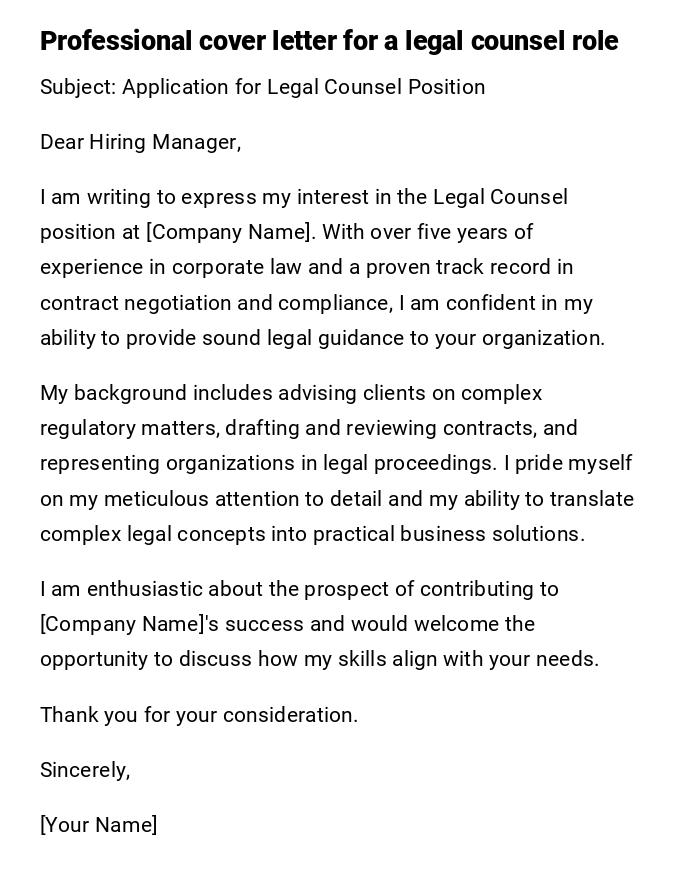
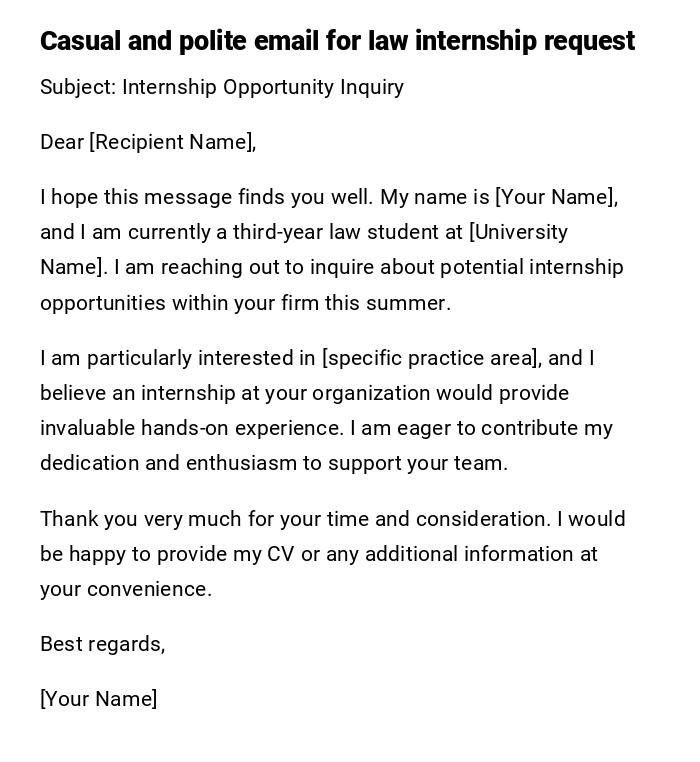
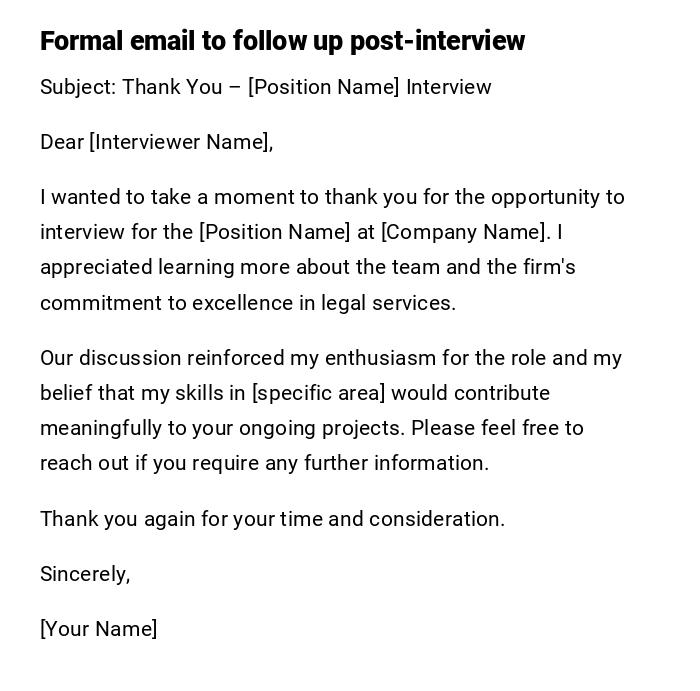
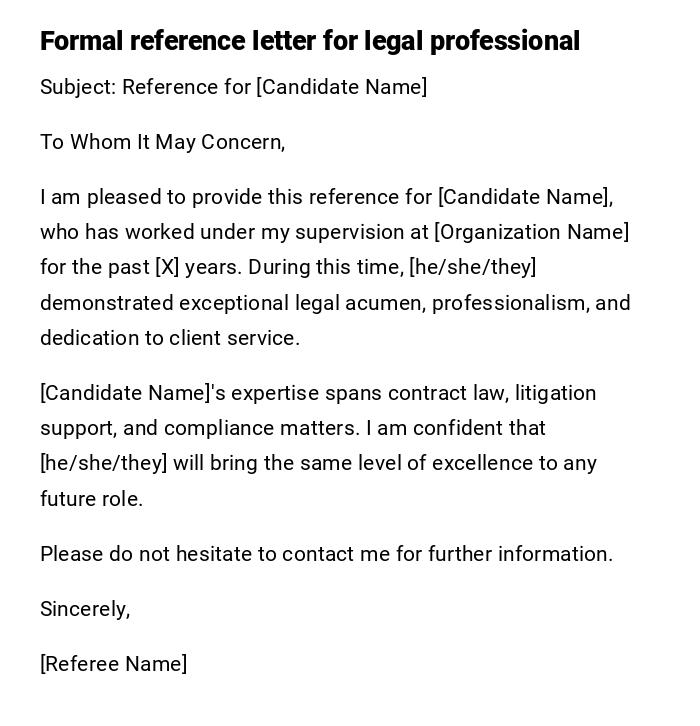
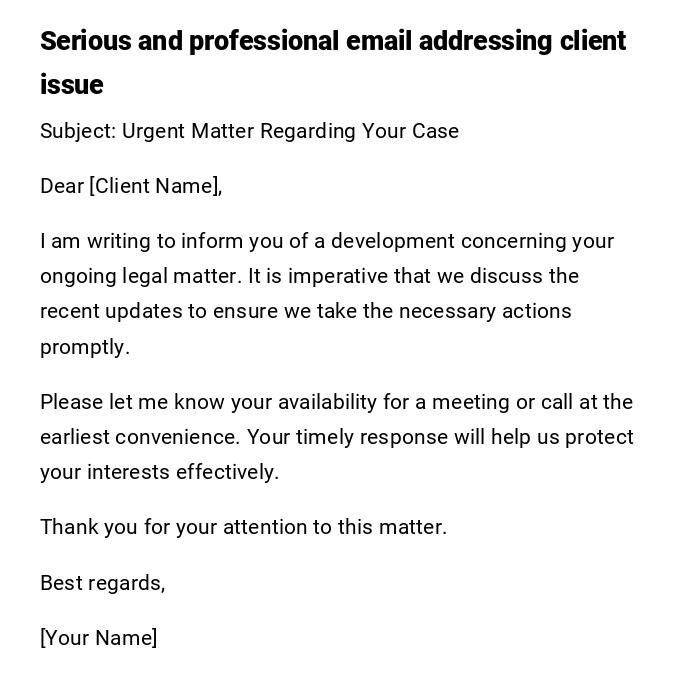

 Download Word Doc
Download Word Doc
 Download PDF
Download PDF